|
|
|
Sort Order |
|
|
|
Items / Page
|
|
|
|
|
|
|
| Srl | Item |
| 1 |
ID:
149823
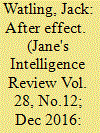

|
|
|
|
|
| Summary/Abstract |
Allied forces have begun the offensive to retake the northern Iraqai city of Mosul from the Islamic State. Reporting from Iraq, Jack Watling analyses how the successful recapture of the city will effect broader political and sectarian dynamics in the country.
|
|
|
|
|
|
|
|
|
|
|
|
|
|
|
|
| 2 |
ID:
155628
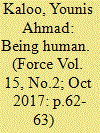

|
|
|
|
|
| Summary/Abstract |
On September 14 this year, the Indian Air Force (IAF) carried out its latest task as part of its humanitarian assistance and disaster relief (HADR) operation by airlifting tonnes of relief material to Bangladesh, which is witnessing a surge in Rohingya refugees fleeing violence in Myanmar. India acted like a good friend and neighbour and under Operation Insaniyat, offered help to Bangladesh to deal with the humanitarian crisis. Since late August, nearly 400,000 Rohingya Muslims have fled to Bangladesh.
|
|
|
|
|
|
|
|
|
|
|
|
|
|
|
|
| 3 |
ID:
148666
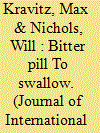

|
|
|
|
|
| Summary/Abstract |
Indiscriminate killing, chemical warfare, the rise of extremists, and the worst humanitarian crisis since World War II make it easy to overlook important details of the Syrian conflict. The destabilization of Syria has created an environment uniquely suited for cultivating illicit economies, particularly the production and transportation of illegal drugs such as Captagon. Little known outside of the Middle East until 2014, Captagon production in Syria adds a new dimension to a conflict that already has numerous competing forces. Hezbollah, a known supporter of the Assad regime and ally of Iran, is most likely the major producer of Captagon within Syria. Meanwhile, the most prolific consumers of Captagon are in the Gulf nations of Saudi Arabia, Qatar, and the United Arab Emirates. While the Gulf states’ governments are supporting the Syrian opposition against the Assad regime, their populations are financially supporting the Hezbollah and Assad. This article defines Captagon, uncovers its journey to Syria, and unpacks the evidence indicating Hezbollah’s involvement in the Captagon trade. Nations of the Gulf need to bolster their partnerships with Western allies to put an end to illegal drug financing through acknowledgement, education, and increased enforcement.
|
|
|
|
|
|
|
|
|
|
|
|
|
|
|
|
| 4 |
ID:
080733
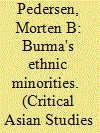

|
|
|
|
|
| Publication |
2008.
|
| Summary/Abstract |
The nearly 60-year-long fight by Burma's ethnic minorities for autonomy and ethnic rights lies at the root of the country's broader political and humanitarian crisis. Yet, in the outside world, this issue is often subsumed under the better-known struggle for democracy, led by Aung San Suu Kyi and the National League for Democracy. The present article seeks to redress this imbalance by directing attention to the numerous groups representing ethnic minority interests, the grievances and aspirations that motivate their struggle, and their own strategies for peace. It argues that in Burma's deeply divided society peace and democracy are two distinct challenges, even if in the long term they must go together, and it calls for the international community to help the country's ethnic groups prepare for future peace negotiations and overcome the debilitating legacy of war
|
|
|
|
|
|
|
|
|
|
|
|
|
|
|
|
| 5 |
ID:
078565
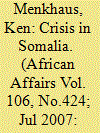

|
|
|
|
|
| Publication |
2007.
|
| Summary/Abstract |
Somalia's catastrophic humanitarian crisis of 2007, in which up to 300,000 Mogadishu residents were displaced in fighting pitting Ethiopian and Transitional Federal Government (TFG) forces against a complex insurgency of clan and Islamist opposition, was the culmination of a series of political miscalculations and misjudgements on the part of Somali and external actors since 2004. They resulted in a cascading sequence of political crises which plunged Somalia into increasingly intractable conflicts. This 'tragedy in five acts' includes the flawed creation of the TFG in late 2004, which emerged as a narrow coalition rather than a government of national unity; the failure of a promising civic movement in Mogadishu in summer of 2005 to challenge the power base of warlords and Islamists in the capital; the disastrous decision by the US government to encourage an alliance between its local counter-terrorism partners in Mogadishu, producing a war which led to the victory of the Council of Islamic Courts (CIC) in June 2006; the radicalization of the CIC over the course of 2006, which guaranteed a war with Ethiopia; and the Ethiopian offensive against the CIC in late 2006, leading to its occupation of the capital, a complex insurgency against Ethiopian forces and armed violence which produced what the UN described as a 'humanitarian catastrophe'. In virtually every instance, key actors took decisions that produced unintended outcomes which harmed rather than advanced their interests, and at a cost in human lives and destruction of property that continues to mount.
|
|
|
|
|
|
|
|
|
|
|
|
|
|
|
|
| 6 |
ID:
058777
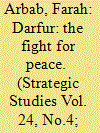

|
|
|
| 7 |
ID:
125223
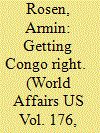

|
|
|
| 8 |
ID:
161123


|
|
|
|
|
| Summary/Abstract |
This article explores the phenomenon of herdsmen militancy as a new trajectory for the farmer–herder crisis in Nigeria, with reference to its humanitarian implications. Relying on a systematic analysis of secondary data and aligning with the analytical anchorage of liberal political ecology theory, the article posits that herdsmen militancy depicts a contradiction in agrarian relations in the context of a national security crisis which has been complicated by salient socio-ecological factors such as climate change, armed violence, and identity politics. In view of the dire humanitarian consequences of this situation, the article submits that herdsmen militancy constitutes a major threat to human and national security in Nigeria. It makes a case for a pragmatic policy capable of mitigating the myriad socio-ecological factors that tend to trigger herdsmen militancy, with prohibition on open grazing in critical hotbeds of herder–farmer conflict as a strategic measure.
|
|
|
|
|
|
|
|
|
|
|
|
|
|
|
|
| 9 |
ID:
060292
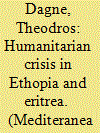

|
|
|
| 10 |
ID:
121247
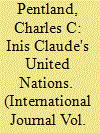

|
|
|
|
|
| Publication |
2013.
|
| Summary/Abstract |
On 1 October 2012 Canada's foreign minister addressed the United Nations
general assembly. Embedded in an otherwise bland text were several sharp
jabs at the UN, notably concerning the self-absorption of the organization's
internal reform processes and the inadequacy of its response to humanitarian
crises such as that engulfing Syria.1
These criticisms, predictably echoed in
the right wing of the Canadian media, soon evoked ripostes whose burden
was that the minister seemed woefully, perhaps willfully, ignorant of the
organization he was criticizing: UN reform is a process for which western
governments, including Canada's, had pressed for years; and it was some
member-states, not the UN as such, that were hesitant over Syria.2
|
|
|
|
|
|
|
|
|
|
|
|
|
|
|
|
| 11 |
ID:
128933
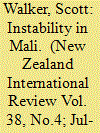

|
|
|
| 12 |
ID:
080789
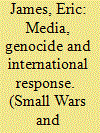

|
|
|
|
|
| Publication |
2008.
|
| Summary/Abstract |
This analytical article asks the question: to what degree did the media contribute to the Rwandan genocide and what might have been done about it? In examining the historical development of mass media in Rwanda, this paper argues that while hate media clearly contributed to the dynamics that led to genocide, its role should not be overstated. While it is commonly believed that hate media was a major cause of the genocide, instead it was a part of a larger social process. The use of violent discourse was at least as important as, for example, the availability of weapons in carrying out the genocide. Put another way, violent discourse was necessary but not sufficient by itself to cause the genocide of 1994. In arguing this thesis, Rwandan history is examined to demonstrate the processes of communication in the formation of destructive attitudes and behaviour. Next, analysis of the methods and content of propaganda campaigns is discussed. Finally, an overview of the requirements and organizations for third parties to conduct international communication interventions is presented in the last section
|
|
|
|
|
|
|
|
|
|
|
|
|
|
|
|
| 13 |
ID:
095600
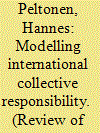

|
|
|
|
|
| Publication |
2010.
|
| Summary/Abstract |
Since its popular appearance in 2001, the responsibility to protect has gained wide attention. Yet, the meaning of responsibility in the R2P report has remained unexamined. The first task of this article is to conceptualise responsibility as it seems to arise from the R2P report. It is argued that the responsibility in the report is collective in nature, and analogous to obligations erga omnes and collective responsibility to extinguish fires before the institutionalisation of fire departments. The second task is to provide a model of collective responsibility with criteria that allow dividing the burden of fulfilling the common responsibility among the members of the collective. The model bridges the conceptual level with the level of practice.
|
|
|
|
|
|
|
|
|
|
|
|
|
|
|
|
| 14 |
ID:
111272
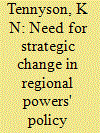

|
|
|
| 15 |
ID:
062027
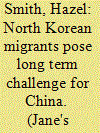

|
|
|
| 16 |
ID:
090767
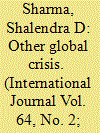

|
|
|
|
|
| Publication |
2009.
|
| Summary/Abstract |
Like the financial crisis, the severity of the food crisis caught gobernments around the world by surprise. This confusion and unpreparedness was vividly reflected by the former leader of the world's richest and most powerful nation, US President George W. Bush, whose initial reaction was to blame developing countries implicitly for the crisis by noting that when poor countries like India and China prosper, they start demanding better nutrition and better food and when demand is high, that causes the pricess to go up.
|
|
|
|
|
|
|
|
|
|
|
|
|
|
|
|
| 17 |
ID:
077774


|
|
|
|
|
| Publication |
2007.
|
| Summary/Abstract |
This study predicts forced migration events by predicting the civil violence, poor economic conditions, and foreign interventions known to cause individuals to flee their homes in search of refuge. If we can predict forced migration, policy-makers can better plan for humanitarian crises. While the study is limited to predicting Haitian flight to the United States, its strength is its ability to predict weekly flows as opposed to annual flows, providing a greater level of predictive detail than its 'country-year' counterparts. We focus on Haiti given that it exhibits most, if not all, of the independent variables included in theories and models of forced migration. Within our temporal domain (1994-2004), Haiti experienced economic instability, low-intensity civil conflict, state repression, rebel dissent, and foreign intervention and influence. Given the model's performance, the study calls for the collection of disaggregated data in additional countries to provide more precise and useful early-warning models of forced migrant events
|
|
|
|
|
|
|
|
|
|
|
|
|
|
|
|
| 18 |
ID:
184588
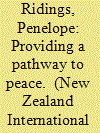

|
|
|
|
|
| Summary/Abstract |
International law and multilateral institutions provide a pathway to addressing the conflict in Ukraine. They must be harnessed to bring about dialogue and an end to the fighting. Diplomacy and technical assistance must be used to advance ceasefire talks and humanitarian access to conflict affected areas. The investigations, inquiries and humanitarian work already underway should continue, as should negotiation and mediation efforts. It is through international law and multilateral institutions that a path can be found to address international conflicts, but it requires a commitment to peace and a focus on resolution of the conflict and the resulting humanitarian crisis.
|
|
|
|
|
|
|
|
|
|
|
|
|
|
|
|
| 19 |
ID:
154085
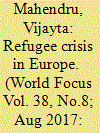

|
|
|
|
|
| Summary/Abstract |
In order to escape increasing political violence in West Asia and Africa, refugees are fleeing by sea to seek asylum in Europe, which is experiencing the highest influx of refugees since the Second World War. Unable to form a collective response, European Union member states are scrambling for a solution, which has led to a humanitarian crisis.
|
|
|
|
|
|
|
|
|
|
|
|
|
|
|
|
| 20 |
ID:
176157
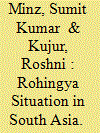

|
|
|
|
|
| Summary/Abstract |
The Rohingya Community has been facing a worst amount of persecution and subject to the human rights violations endangering their life, dignity and property, after the colonial rule. Various state actors have tried to shift the humanitarian responsibility resulting inhuman attitude not only by the state of Myanmar but also by the global society to some extent. The paper has tried to briefly focus on the historical events and the present deplorable situation of the Rohingya as a vulnerable Community in South Asia.
|
|
|
|
|
|
|
|
|
|
|
|
|
|
|
|
|
|
|
|
|